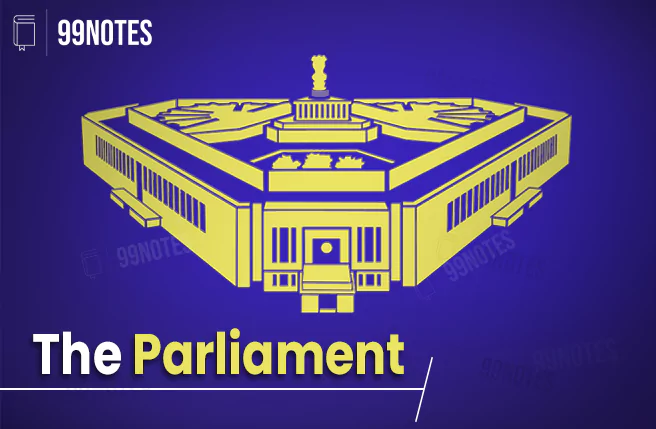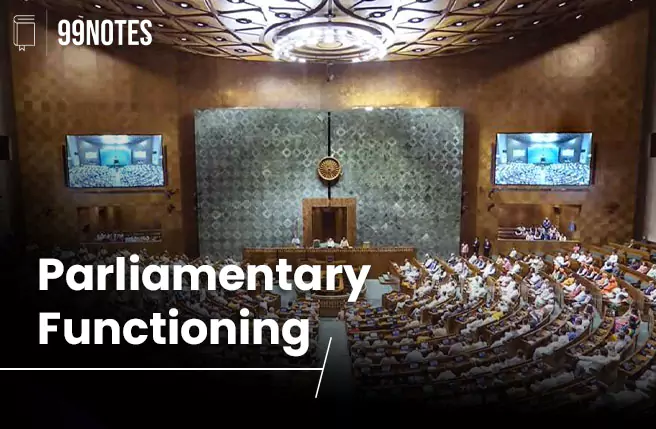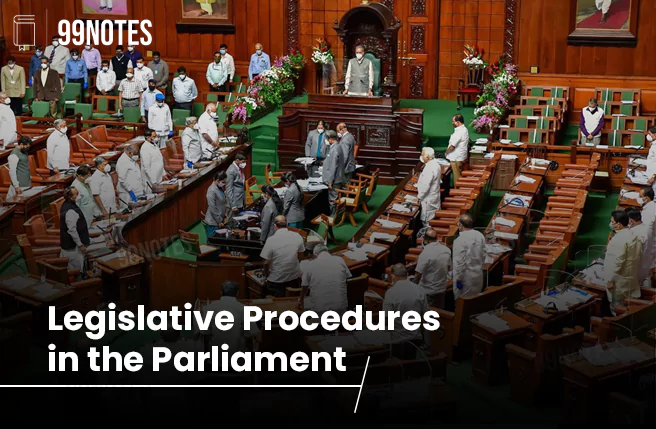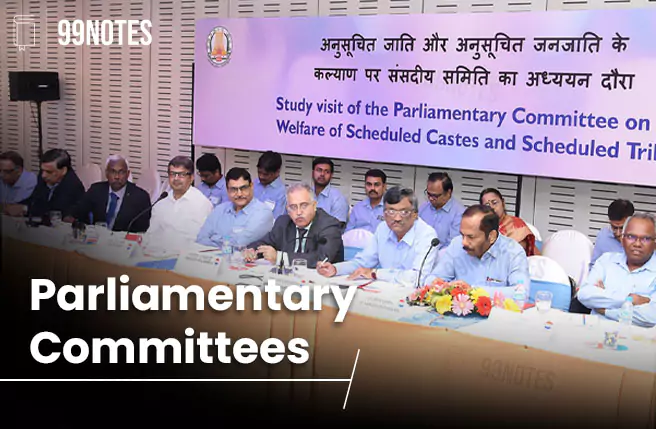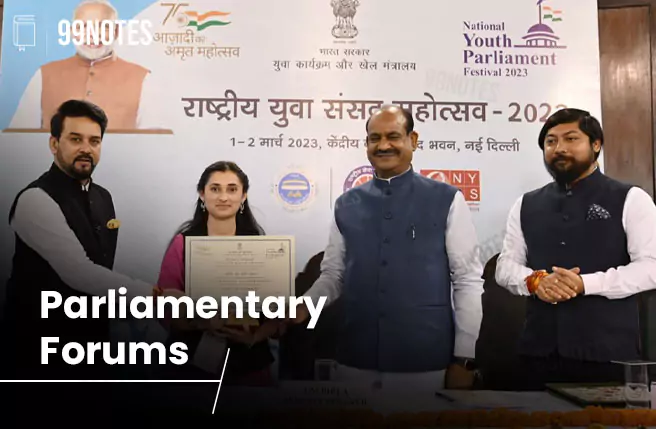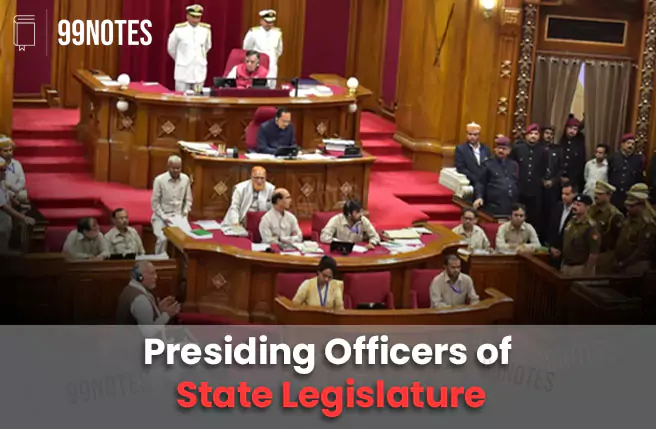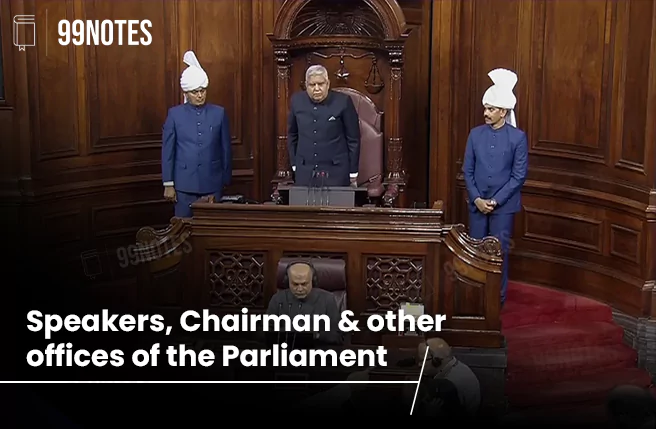The Parliament
The Union Legislature in the Indian Constitutional set-up is known as the Indian Parliament. It is modelled after the British Parliament, wherein the Executive is collectively responsible to the Parliament. This is known as the Parliamentary form of government.
According to former President KR Narayanan, “Parliament and legislatures constitute the head and front of the body-politics in India. They are the institutional embodiments of the audacious experiment in democracy by the founding fathers of our republic.”
Did you Know? |
| The first Parliament was constituted in May 1952, after the first general elections; till then, the Constituent Assembly acted as provisional Parliament. |
Composition of the Parliament
The Constitution of India, in Article 79, provides for a Union legislature that consists of the President and the two houses, namely the House of People (Lok Sabha) and the Council of States (Rajya Sabha). While the Lok Sabha is subject to dissolution, the Rajya Sabha is a permanent body.
Even though the President is not a member of the Parliament and does not participate in the proceedings of the House, s/he is an integral part of the Parliament due to the following reasons:
- S/he summons and prorogues the session of Parliament;
- Dissolves the Lok Sabha;
- Addresses both houses at the beginning of the Lok Sabha and the first session of each year;
- Promulgates ordinances when the Parliament is not in session;
- Legislation becomes an act only after the President’s assent.
Lok Sabha
The House of the People or the Lok Sabha (the Hindi name was adopted in 1954) represents the people of India as a whole and consists of members who are directly elected by the people.
- It has a maximum strength of 550 members, with 530 members representing the states and 20 members representing the Union territories.
- The current membership of Lok Sabha is 543.
104th Constitutional Amendment Act, 2019 |
|
Rajya Sabha
The Council of States or the Rajya Sabha (the Hindi name was adopted in 1954) represents the states and the Union territories, and it is a permanent house in which members are indirectly elected by state legislative assembly members (MLAs).
- The maximum strength of the upper House is 250, out of which 238 members represent the states and the Union territories (with legislature) and 12 members nominated by the President.
- The Nominated members are eminent personalities from different walks of life, such as literature, science, arts and social work.
- The current strength of the House is 245.
Elections to the Lok Sabha
The members of the Lok Sabha are elected through a direct election based on a universal adult franchise and a ‘first past the post’ system. In this section, we’ll look at the various provisions related to the election of Lok Sabha.
Territorial Constituencies (Delimitation)
The states are divided into territorial constituencies for conducting direct elections and electing members from each constituency. The Constitution makes the following provisions in this regard:
- Each state is allocated a fixed number of seats in a manner that the ratio between the population and seats remains uniform across the states. However, this provision does not apply to states with a population of less than 60 lakhs.
- Further, the states are divided into constituencies in a manner that each seat represents the same population.
The term ‘population’ here means the population in the preceding census which has been published.
Delimitation
- After each census, readjustment has to be made both in the allocation of Lok Sabha seats to the states and the division of states into constituencies.
- The Constitution has empowered the Parliament to determine the manner in which these adjustments have to be carried out and set up an appropriate authority for that. In line with this provision, the Parliament passed delimitation acts in 1952, 1962, 1972 and 2002.
- To promote population control measures, the 42nd Constitutional Amendment Act 1976 froze the allocation of seats to the states and division of states into constituencies by 2000, at the 1971 level. This was extended till 2026 by the 84th Constitutional Amendment Act, 2001.
- Further, the 87th Constitutional Amendment Act 2003 permitted the adjustment of seats within the states as per the census figures of 2001.
Reservation of Seats for the SCs and STs in the Lok Sabha
- To deal with the backwardness and historical injustices towards Scheduled Tribes and Scheduled Castes, the Constitutions had provided for the reservation of seats in the Lok Sabha for SCs and STs in proportion to their population in states.
- It is to be noted that this provision is not equivalent to the separate electorate; the candidates are elected by all the general electorate, i.e. voters of that constituency.
- The original Constitution had provided for this reservation to continue for 10 years only; however, it has been extended continuously through several amendments, each shifting it forward by 10 years. Last, it was amended through the 104th Constitutional Amendment Act that extended the reservations till 2030.
- The 87th Constitutional Amendment Act has provided for the fixing of reserved seats on the basis of 2001 census
Provisions for Reservation of Seats in the Lok Sabha for Women (106th Constitutional Amendment Act)
The Parliament in September 2023 passed the Constitution (One Hundred and Twenty-Eighth Amendment) Bill, 2023, also known as Nari Shakti Vandan Adhiniyam, providing reservation for women in 1/3rd of the seats in Lok Sabha and the state legislatures.
The reservations would continue for 15 years and can be further extended by the Parliament.
It amends the following Articles of the Constitution:
- Article 239AA: 1/3rd of the seats in the assembly of the National Capital Territory of Delhi shall be reserved for women. It includes 1/3rd horizontal reservation in seats for SCs.
- Insertion of Article 330A: 1/3rd of the seats in Lok Sabha shall be reserved for women. It includes 1/3rd horizontal reservation in seats reserved for SCs and STs.
- Insertion of Article 332A: 1/3rd of the seats in state assemblies shall be reserved for women. It includes 1/3rd horizontal reservation in seats reserved for SCs and STs.
- Insertion of 334A: The provisions for reservation would come into effect after the delimitation is undertaken on the basis of the first census after the commencement of this Act. The reservation of seats in Lok Sabha and state assemblies will cease to have effect after the expiration of 15 years from such commencement.
Note: The strength of women MPs in the current Lok Sabha (17th Lok Sabha) is 15%, and in the Rajya Sabha the number is 14%.
‘First Past the Post’ System Vs Proportional Representation |
i. It is a complicated system which may be difficult for an illiterate voter to comprehend; ii. There is no scope for bye-elections; iii. In this system, there is no real connection between the voters and the representatives. iv. It may lead to the proliferation of small regional parties, which might bring instability to the political system. |
Term of Lok Sabha
The term of Lok Sabha is five years from the date of the first sitting after the general elections.
- However, the President is empowered (on the advice of the Council of Ministers) to dissolve the Lok Sabha at any time.
- During National Emergency, the term of Lok Sabha can be extended for 1 year at a time for an indefinite period of time.
61st Amendment Act, 1987 |
| The amendment changed the voting age in Lok Sabha elections and state legislative assemblies from 21 years to 18 years. |
Election to the Rajya Sabha
The Rajya Sabha (Upper House) represents the States and Union Territories, and its representatives are indirectly elected by the members of the state legislative assembly.
- The election of the Rajya Sabha happens on the basis of proportional representation through a single transferable vote system.
- The elections are conducted on the basis of an open ballot system to prevent cross-voting (This provision was added by amending 39AA of the Conduct of the Election Rules 1961 in 2003).
- The representation of states in Rajya Sabha is proportional to the population of the state; the bigger the state, the bigger the representation. For example, Uttar Pradesh sends 31 Rajya Sabha members, while states like Sikkim and Tripura send 1 member each.
- Union territories that do not have legislature do not get represented in the Rajya Sabha.
Constituencies of the Rajya Sabha
The Rajya Sabha members do not represent a constituency since they are elected on the basis of proportional representation. They represent the state as a whole.
Term of Rajya Sabha Member
Unlike Lok Sabha, Rajya Sabha is a permanent body, not subject to dissolution.
- Every Rajya Sabha member enjoys a term of six years. The 1/3rd members of the Rajya Sabha retire every two years, and in their place, new members are elected. Thus, the Rajya Sabha never dissolves fully.
- The members are eligible for re-election any number of times. A person elected against a mid-term vacancy remains a member for the rest of the term only. It ensures continuity in the working of the House.
Did you know? |
| In the first batch of Rajya Sabha (1952), members were retired on the basis of a lottery system (In the 2nd and 4th years, 1/3rd of the members retired through the lottery system). |
Members of Parliament
Qualification
The Constitution has laid down some qualifications for the candidates for membership in the Parliament. Additionally, the Parliament has also laid down some qualifications in the Representation of People Act 1951.
According to the Constitution, every member of Parliament must:
- Be a citizen of India.
- Swear an oath or affirmation stating that s/he will bear true faith and allegiance to the Constitution of India and uphold the sovereignty and integrity of India.
- Be at least 25 years old in the case of Lok Sabha and 30 years old in the case of Rajya Sabha.
- Adhere to other qualifications prescribed by the Parliament, such as those prescribed under the Representation of People Act 1951.
Additional qualifications under the Representation of People Act 1951:
- Each Member of Parliament must be registered as an elector in any parliamentary constituency; this applies both to Lok Sabha’s and Rajya Sabha’s candidatures.
- Earlier, there was a provision that the Rajya Sabha candidate must be an elector in the state from which s/he is contesting. This provision was done away with in 2003.
- Further, a candidate for the Lok Sabha constituency must belong to the reservation category for which the seat is reserved.
Disqualification
The Constitution, under Article 102, has provided for the disqualification of members of Parliament in certain conditions if a person is:
- Holding any office of profit under the central or state government (except for the office of minister or any other offices exempted by Parliament);
- Not an Indian citizen, or has voluntarily acquired the citizenship of a foreign state, or has declared his allegiance to a foreign state;
- Of Unsound mind and declared so by a court.
- An undischarged insolvent;
- Disqualified under any law made by the Parliament – The Parliament has passed the Representation of People Act 1951 under this provision.
Additional grounds for disqualification as provided under the Representation of People Act 1951:
- If the person has been found guilty of electoral offences and corrupt practices in elections,
- If the person is convicted of an offence resulting in imprisonment of more than 2 years. However, this provision does not apply in the case of preventive detention;
- If the person fails to declare accounts of his/her election expenditure,
- If the person has been convicted for promoting enmity between different groups or for the offence of bribery,
- If the person has been dismissed from government service on account of corruption or disloyalty towards state;
- If the person has been penalised for advocating or practising social evils such as Sati, dowry, untouchability;
- The person must not have any interest in government contracts and services;
- The person must not be a director or managing agent in a corporation in which the government has 25% or more stake.
If any question arises regarding the disqualification of members of the legislative assembly, the Governor’s decision is final. The Governor makes the decision based on the opinion of the Election Commission, and that opinion is binding.
Anti-Defection Law |
| The Parliament has provided for the disqualification of representatives on the grounds of defection. These Provisions have been added to the 10th Schedule of the Constitution:
a. If the person voluntarily gives up the membership of the party on whose symbol s/he has been elected to the House; b. If the person abstains from voting or votes against the directions of the party whip.’ c. If any independent elected representative joins a political party, d. If any nominated representative joins a political party after the expiration of 6 months, The disqualification under the 10th Schedule is adjudicated by the Speaker in the case of Lok Sabha and by the Chairman in the case of Rajya Sabha. |
Vacancy of Seats
A Member of Parliament vacates his/her seat in the following circumstances:
- Dual Membership: The Representation of People Act, 1951 has made the following provisions regarding the dual membership of a representative:
- If a person is elected to both Houses of the Parliament, s/he must inform within 10 days as to which House s/he desires to serve;
- If a sitting member of one House is elected to the other House, his/her membership in the first House stands vacant;
- If a person is elected on two seats in the same House, s/he must choose the desired seats; otherwise, both seats become vacant.
Similarly, as per the Prohibition of Simultaneous Membership rules, 1950, a person cannot be a member of both the Parliament and the state legislature.
- Disqualification: If a person is disqualified on the grounds laid by the Constitution, the Representation of People Act and Anti-defection law (10th Schedule), his/her seat becomes vacant. If a disqualified person is elected to the Parliament, the Representation of People Act empowers the High Courts to declare the election void.
- Resignation: A member can resign from his/her membership by addressing the resignation letter to the Speaker or Chairman, depending on the House to which s/he belongs. The seat becomes vacant upon the acceptance of the resignation. However, the Speaker/Chairman may refuse to accept the resignation if s/he finds it not voluntary or genuine.
- Absence: The seat of a Member of Parliament can be declared vacant if s/he is absent from the meetings of the House for a period of sixty days without permission.
- Other grounds:
- If the election of a member is declared void by the Court,
- If s/he is expelled from the House (For example- on disciplinary grounds),
- If the member is appointed to a Constitutional post like President, Vice-President or Governor.
Oath and Affirmation of a Member of Parliament
Every Member of Parliament must take an oath or affirmation before taking his/her seat. The oath or affirmation is administered by the President or any other person designated by him/her. The oath and affirmation of a Member of Parliament is mentioned in the 3rd Schedule of the Constitution.
Remuneration of the Member of Parliament
- The salary and allowances of MPs are determined by the Parliament from time to time.
- In 2018, the salary was increased from ₹50,000 to ₹1 lakh per month, the constituency allowance from ₹45,000 to ₹70,000 per month and the office expenses allowance from ₹45,000 to ₹60,000 per month. They are also entitled to a daily allowance of ₹2000 for attending the Parliament session.
- The members are also entitled to pension on a graduated scale for each five-year term.
Role of Parliament
In the Parliamentary System of government, the Parliament occupies a central role; it is the supreme legislative body. It is a multi-functional body that performs various kinds of roles. These roles are discussed below:
Legislative Role
The Parliament has exclusive law-making powers in matters of subjects in the Union List and residuary list, and with regard to the Concurrent list, it has overriding powers, which means in case of conflict between the state laws and union laws on the Concurrent list, the latter would prevail.
- Ordinances promulgated by the President must be approved by the Parliament within 6 weeks after the convention of the Parliament.
- The Parliament is also empowered to make laws on subjects in the state list under certain circumstances.
Amending Powers of the Constitution
- Besides law-making, the Parliament is also empowered to amend the Constitution (without affecting its basic features).
- Most of the provisions can be amended by a special majority; however, certain provisions that have implications on the federal scheme of the Constitution also need ratification by states.
You can read in detail about the amending powers of Parliament here.
Control Over Executive
In a Parliamentary form of government, there is a fusion of power between the Executive and legislature.
- The Executive is responsible towards the Parliament for all its acts. The Prime Minister and the Council of Minister is responsible to the legislature, both individually and collectively.
- The Parliament exercises control over the Executive through several parliamentary devices such as Question hour, zero hour and through motions such as calling attention motion, adjournment motion, censure motion, cut motion, etc. (we will read them in detail in ‘Legislative Procedures’)
- The Parliament can remove the ministry (Council of Ministers) by passing a no-confidence motion or by refusing to endorse a confidence motion.
- The Lok Sabha can also express its lack of confidence in the Council of Ministers by not passing the Budget, Money bills and even ordinary legislation.
Financial Functions
As a custodian of public money, the Parliament performs several financial functions.
- No money can be spent, and no tax can be levied by the Executive without the approval of the Parliament; for this purpose, the Budget is laid before the Parliament for its approval.
- The Parliament also scrutinises government expenditure through its financial committees like the Pubic account committee, Estimates Committee,
Electoral Functions
- The Members of Parliament participate in the election of the President and Vice President.
- The Member of Parliament also elects the presiding officers of both houses.
- The Parliament is also empowered to make laws related to the election of the President and vice-president and to both houses of the Parliament and state legislature.
Quasi-Judicial functions
The Parliament exercises some quasi-judicial functions, which include the following:
- It can remove certain high-ranking functionaries such as:
-
- The President
- The Vice President
- Judges of the High Court and Supreme Court
- Chief Election Commissioner
- Comptroller and Auditor General.
- The Parliament can also penalise its members or outsiders for contempt or breach of privilege.
Miscellaneous Functions
Besides the above-mentioned powers and functions, the Parliament also exercises and performs certain other powers and functions, such as:
- Besides law-making, it also discusses and deliberates upon matters of national and international importance.
- The Parliament approves the declaration of proclamation of Emergency by the President.
- It can admit or establish new states, alter the boundaries of existing states and change the name of states; it can also make a state into a union territory and vice-versa.
- The Parliament can create or abolish state legislative councils at the request of the concerned state.
- The Parliament can expand (but not curtail) the jurisdiction and powers of the Supreme Court and High Court. It can also provide for a common High Court for two or more states.
Position of Rajya Sabha
As we have seen, the composition of the Rajya Sabha is different from that of the Lok Sabha; its election process also differs with respect to the Lok Sabha. Its distinct position can be best understood by juxtaposing it with the status of the other House.
Equal Powers with respect to Lok Sabha
- Introduction and passage of ordinary bills (other than money bills) and Constitutional Amendment bills.
- In the election of the President and the Vice-President.
- In the procedure of the removal of the President, the Vice-President, the judges of the Supreme Court and High Court, the Chief Election Commissioner and the Comptroller and Auditor General of India.
- In approving the declaration of proclamation of Emergency (including the President’s Rule), the President.
- The Ministers (including the PM), even though they are responsible to the Lok Sabha, can also be picked from the upper House.
Unequal Powers with respect to the Lok Sabha
- A money bill cannot be introduced in the Rajya Sabha, nor can it reject or amend the bill. Also, the authority to designate a particular bill lies with the Speaker.
- A financial bill that has provisions in addition to the provisions in Article 110 cannot be introduced in the Rajya Sabha, though it has powers with regard to the passage of the bill.
- The joint session of the two Houses is chaired by the Speaker and, in his absence, the deputy speaker of the Lok Sabha.
- The Rajya Sabha has limited power with respect to the Budget; it can discuss the provisions of the Budget but cannot vote on the demand for grants.
- A resolution for discontinuation of National Emergency (Article 352) can only be initiated and passed in Lok Sabha.
- It has no power with respect to the No-confidence motion; it can only introduced in the Lok Sabha. The Council of Ministers (CoM) is only responsible to the Lok Sabha.
Exclusive Powers of the Rajya Sabha
Three powers are given exclusively to the Rajya Sabha:
- Under Article 249, Parliament can be authorised to legislate on state-list subjects.
- Under Article 312, it can authorise the Parliament to create a new All India Services.
- The resolution to remove the Vice-President can only be initiated in the Rajya Sabha. The Vice-President stands removed when a resolution is passed by the upper House with a special majority and agreed to by the lower House by a simple majority.
By this comparison, it is evident that Rajya Sabha does play a crucial role in the Constitutional set-up. If we compare it with similar institutions in countries like the United Kingdom and the United States of America, we find that our Constitution framer chose a middle path so as to not belittle its position and also not allow it to obstruct the functioning of the Executive.
Relevance of Rajya Sabha |
1. It checks the hasty, ill-conceived or politically motivated legislation and allows for a second look. 2. A two-house legislature means more expertise and talent, which allows for wider scrutiny of legislation and also shares the burden of other House. 3. It brings sobriety in the debates and discussions since it consists of people who have excelled in different walks of life and are not in the political fray. 4. It allows for the representation of eminent professionals and experts in the Parliament as well as the ministry, who cannot otherwise be directly elected. 5. It also has an important role in preserving the federal structure by representing the interests of states and preventing legislation that may harm the federal structure. 6. It provides continuity to the Indian Parliamentary democracy since it is a permanent body and not subject to dissolution, unlike Lok Sabha. |
Parliamentary Privileges
- Parliamentary privileges are special rights and immunities provided to the Parliament and its members to maintain their honour, dignity and authority and to ensure they fulfil their parliamentary responsibilities without hindrance and fear of repercussions.
- Article 105 and 122 provides for parliamentary privileges for the Lok Sabha and the Rajya Sabha, respectively. This feature was taken from the British Constitution.
- The Parliamentary privileges are also extended to non-members who are allowed to participate and speak in the proceedings of a chamber of Parliament and its committees. These persons include the Attorney General of India and Union Ministers.
Source of the Parliamentary Privileges
The original Constitution only mentioned two privileges: the freedom of speech in Parliament and the right of publication of its proceedings. For other privileges, it provided that they would be equivalent to the British parliamentary privileges. It has also empowered the Parliament to define these privileges.
However, in the 44th Constitutional Amendment in 1978, a direct reference to the British Parliament was dropped, but the privileges remained the same, as were being followed till then.
Thus, the existing privileges are based on the following sources:
- The Constitution gives freedom of speech and the right of publication of proceedings.
- Parliamentary conventions and precedents were being followed before 1978 that are loosely based on privileges in the British Parliament.
- Rules of procedures of both the houses;
- Statutory Provisions: For example, the Code of Civil Procedure, 1908, provides for freedom from arrest and detention of MPs and MLAs under civil process.
- Judicial interpretations.
Types of Parliamentary Privileges
The privileges are of two types:
- Individual Privileges: These are enjoyed by the MPs individually.
- Collective Privileges: These privileges are enjoyed collectively by both houses of the Parliament.
Individual Privileges
- Freedom of speech in the Parliament: the members are immune from court proceedings for their acts in the Parliament.
- Freedom from arrest and detention of MPs under civil process during the ongoing meeting of the House and committees and 40 days prior to it and 40 days after its conclusion.
- Without the permission of the House, no members or officers of the House can be compelled to provide evidence or to produce documents in courts relating to the proceedings of the House.
- Without the permission of the House and the member itself, no members or officers of the House can be compelled to attend as witnesses before the other House or a House of a State Legislature or a committee.
Collective Privileges
- The Parliament has the right to publish its reports, debates, and other House proceedings. It also has the right to prohibit others from publishing the same. However, the 44th Constitutional Amendment Act restored the right of the press to publish true reports of public parliamentary proceedings (not secret meetings) without prior permission.
- The Parliament can exclude outsiders from proceedings of its meetings and can conduct secret sessions.
- The presiding officer has a right to receive immediate information on the arrest, detention, conviction, imprisonment and release of a member on a criminal charge or for a criminal offence.
- The Parliament can make rules for regulating its procedures, conduct of business and adjudication of such matters.
- No court can enquire about the proceedings of the House.
Penal Powers of the Parliament:
The Parliament is empowered to enforce its privileges in two ways:
- It can suspend or expel the members for violating privileges.
- It can reprimand and even punish outsiders for breach of privileges or contempt of Parliament.
Breach of Privilege and Contempt of Parliament
Even though both the terms are used interchangeably, there are some differences between them. According to constitutional expert Subhash Kashyap, “there may be a contempt of Parliament without specifically committing a breach of privilege.” Contempt of Parliament has broader implications. For instance, disobedience to a house order may not constitute a violation of privilege but may result in sanctions for contempt of the Parliament.
Contempt of Parliament |
| Any act or omission that obstructs or hinders either House of Parliament in the performance of its functions, or that obstructs or hinders any member or officer of such House in the discharge of his/her duty, or which has a tendency, directly or indirectly, to produce such results can be treated as a contempt. |
Breach of Privilege |
| When any of these rights and immunities is violated or attacked, the offence is called a breach of privilege of the House or its members and is punishable under the law of Parliament. |
Privilege Motion and Privilege Committee
When an MP feels that his/her privileges have been breached, s/he can raise a privilege motion with the presiding officer, who can either form a 10-member committee for enquiry or refer the matter to the privileges committee. The Privileges Committee enquire asses such cases and gives its recommendations.
Codification of Parliamentary Privileges
The Parliamentary privileges are based largely on the Parliamentary convention, and therefore, there is a need for the Codification of parliamentary privileges. It is one of the most overdue reforms in the Parliamentary processes for the following reasons:
- Privileges for a section of people are incompatible in a democracy, and undefined privileges make it even worse;
- These privileges are enjoyed by the MPs on behalf of the people so that they can function freely and fearlessly; hence, these privileges cannot be allowed to be used against the people themselves;
- Codification of the privileges is also important to end the necessity of referring to the privileges of the British Parliament.
- Hence, for the independent and effective functioning of the Parliament, the privileges should be clearly defined, simplified and delimited.
Is the Indian Parliament Sovereign?
The sovereignty of Parliament means that the Parliament is the ultimate authority in a political system. Sovereignty refers to the absolute power to make final decisions. In Britain, Parliament has the authority to make and repeal any law and amend the Constitution like ordinary legislation, and there is the absence of a system of judicial review.
Thus, the British Parliament can be termed as Sovereign. In the words of De Lolme, a British political scholar, “The British Parliament can do anything except make a woman man and a man a woman”.
In India, the Parliament is not sovereign; there are some restrictions on its authority, which can be inferred from the Constitution itself and judicial rulings.
Constitutional features which limit the authority of the Parliament:
- Written nature of the Constitution: The Constitution has clearly demarcated the power of the three organs of the government, which are the Executive, the legislature and the judiciary, and defined the interrelationships between them. The Constituent authority (amending power) of the Parliament has been made reasonably rigid and even requires ratification by states in some cases.
- Federal structure: It means the sovereignty of the state is distributed between the political units (centre and federal units, i.e. states). For example, the 7th Schedule provides for the division of power between centre and state in the form of Union list, state list and concurrent list.
- Fundamental Rights: The provision of the fundamental rights in the Constitution restricts the authority of the Parliament. Article 13 of the Indian Constitution prohibits the Parliament from making a law that either takes away or affects fundamental rights.
- Judicial review: Though not explicitly mentioned, the concept of judicial review is inherent in the Constitution in the form of Articles 13, 32, 226, 136, 142, etc. The Supreme Court is the final interpreter of the Constitution, and it has given various rulings that limit the power of the Parliament.
Judicial Rulings which restrict the authority of the Constitution
- The doctrine of Basic Structure: Propounded in the Kesavanand Bharti case, this doctrine provides that the Parliament can amend any provisions of the Constitution, except for its basic structure, features which, if amended or removed, change the identity of the Constitution. Over the years, several Supreme Court judgements have identified the basic features of the Constitution.
- Recognition of the ‘Due process of law’: The Constitution mentions “procedure established by law” in the context of Article 21 (right to life and liberty), which means any law made with the right procedure is valid. However, in the Maneka Gandhi v. Union of India Case (1978), the Apex Court implicitly recognised the “due process of law” when it held that any law that seeks to deprive a person of his/her personal liberty must not be arbitrary, unfair or unreasonable.
However, in a modern democratic state like India, which is run on the principle of checks and balances, it is difficult to locate a sovereign body. In this context, in the AK Gopalan case, the Supreme Court interpreted the term “We the People of India” in the Preamble and concluded that it is the people who declared India sovereign and thus, the ultimate sovereignty rests on their authority.
Decline of Parliament
Being one of the supreme institutions in a Parliamentary democracy, it is very important that the functioning of the Parliament is in line with the spirit of a deliberative democracy. However, over the years, we’ve been witnessing the accelerated erosion of the Parliamentary process and its values.
- Decline in Productivity: Instead of deliberation and discussion, the sessions of the Parliament are marked by continuous disruptions; the productivity of the Lok Sabah, which was at 100% till the 12th Lok Sabha, has declined to 91% in the 13th Lok Sabha, 87% in 14th Lok Sabha and 61% in the 15th Lok Sabha.
As per the data of PRS Legislative Research, the annual average of sitting days has decreased from 121 days during 1952-70 to 63 days during 2009-14, 66 days during 2014-19 and only 56 days in the current Lok Sabha.
- Shift in Institutional Balance: The decline of the Parliament has altered the system of checks and balances; now, the institutional balance has shifted in favour of the Executive. This has taken a toll on regard for parliamentary processes and the position and role of the opposition.
- Disregard for Parliamentary Processes:
-
- Increasingly, the bills are being passed amidst din and noise without due discussion. As per the report of PRS legislative research, in 2020, the Lok Sabha, on average, took less than 10 minutes to pass a bill, and for the Rajya Sabha, it was less than half an hour.
- There is also a continuous decline in scrutiny by Parliamentary standing committees; the percentage of bills being referred to these committees has drastically declined from 71% during 2009-14 to 27% during 2014-19 and 13% since 2019.
- There is an increased recourse to ordinances.
- Lack of Consultation on important issues: Important policy decisions like demonetisation, national lockdown during the pandemic, etc., were taken without consultation with the opposition.
- Volume and Complexity of Functions: With time, the volume and complexity of the Parliament’s function has increased, for which the Parliament lacks expertise. The institution requires reforms to adapt to changing circumstances and improve efficiency.
- Ineffective Financial Committees: The parliamentary committees like the Public Accounts Committee and Estimate Committee only deal with post-expenditure analysis, and they have no control over the ongoing expenditure of the government.
- Increases recourse to Guillotine: The financial business of government, which includes demand for grants and financial bills, are sometimes passed in one go, without going through demand for grants for all ministries separately.
- Growth of subordinate legislation: It has decreased the role of Parliament in law-making in elaborate laws and increased the power of the Executive.
- Changing role of MPs: The increased expectation of the public regarding the availability of their MPs in their constituencies, their involvement in developmental works through MPLADS and involvement in state and local level politics has led to limited availability of time for MPs to partake in Parliamentary works.
- Defections: In the past, defections have decided the fates of many governments; changing parties for ‘better prospects” erodes the foundation of Parliamentary democracy.
- Criminal Elements in Parliament: The number of tainted representatives has been increasing with each Lok Sabha. In the current Lok Sabha, 43% of representatives have some kind of criminal charges on them, of which 29% of them face serious criminal charges like rape, murder etc.
Conclusion: Even though this great institution has endured for seven decades and has been reasonably successful in its objectives, it can remain relevant only as a dynamic institution, continuously reforming itself and adjusting its features and functions to changing times and needs.
Reforms will not bear fruit if done in isolation; there is a need for an integrated approach, which includes simultaneous reforms in Parliament’s functioning, electoral reforms, reforms in political parties, judicial reforms, etc.

